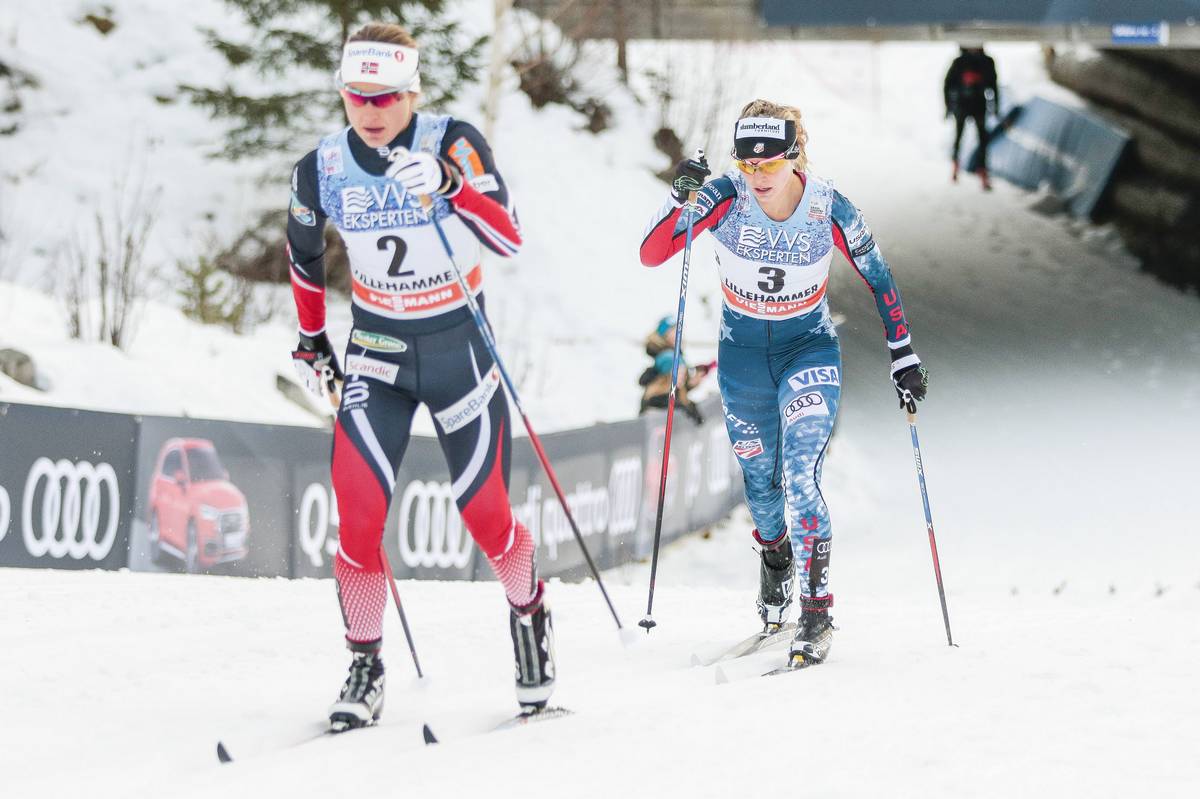
Norway’s Heidi Weng started the 10-kilometer classic pursuit in Lillehammer, Norway, on her own, and she finished just the same: alone, and in first place.
The 25 year old chalked up her first World Cup mini-tour win on Sunday, after winning the classic sprint on Friday and placing second in the 5 k skate in Saturday. Weng started the day with a 20-second cushion separating her from second-place Ingvild Flugstad Østberg in the mini-tour standings, and extended that lead slightly by the middle of the race before ultimately winning by 16.1 seconds.
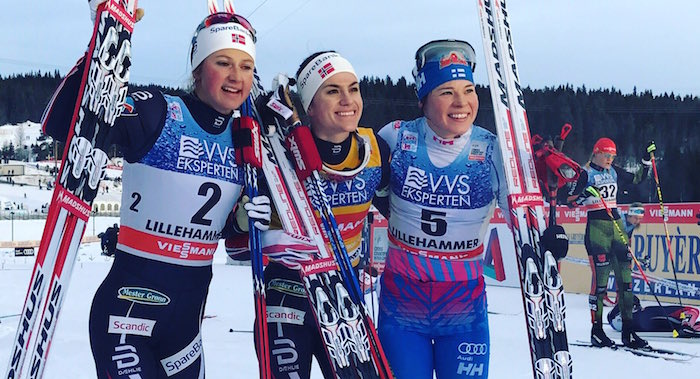
“Today it was not easy at all,” she told FIS. “I felt very tired in the first lap.”
With less than her best form, in her own estimation (she said that the sprint had been her “best day”), Weng hadn’t been confident that she could keep her lead.
“I felt like, ‘Oh no, Ingvild and Krista [Parmakoski] will come,’ but they didn’t, I am very happy with that,” Weng said in the post-race press conference.
But if she was exhausted, she didn’t show it, keeping up her trademark high tempo on the long, grinding climbs of the Lillehammer course.
Østberg kept her lock on second place, although the race didn’t go exactly as she had expected. With American Jessie Diggins starting one second behind her and Norwegian teammate Marit Bjørgen only five seconds after that, Østberg could have been caught and then worked in a pack.

Instead, Diggins and Bjørgen faded and Østberg worked alone for much of the race before being caught by Parmakoski of Finland.
“I thought that maybe Marit and I would be working together in order to catch Heidi, but it turned out to be a race where I had to do things on my own,” Østberg said.
Parmakoski made a move to pass Østberg and try for second place, but crashed on a high-speed downhill corner and lost several seconds. That turned out to be impossible to make up, and the Finn ended up 4.9 seconds behind Østberg in third place.
The three podium finishers congratulated each other in the finish, and it was clear that Østberg hadn’t caused Parmakoski’s crash.
“On the last downhill I had to take my chances if I wanted to win,” Parmakoski told FIS. “The fall was unfortunate but I am happy for third place.”
Parmakoski and Østberg had the two fastest ski times of the day.
(Article continues below)
https://www.instagram.com/p/BNl5DlGBVrD/
“I feel like my body has been working well all season,” Østberg said. “I think Friday and today were the days I felt best… I have felt steadily good so far, but that final edge isn’t there yet. And it probably won’t be there until around New Year’s and the World Championships, but that is also how it’s planned so it’s not hopeless.”
Bjørgen landed fourth (+57.5), and was unable to make up any ground on the leaders. She said that her energy wasn’t all there, between an imperfect training year and taking care of her son, Marius, who is still less than a year old.
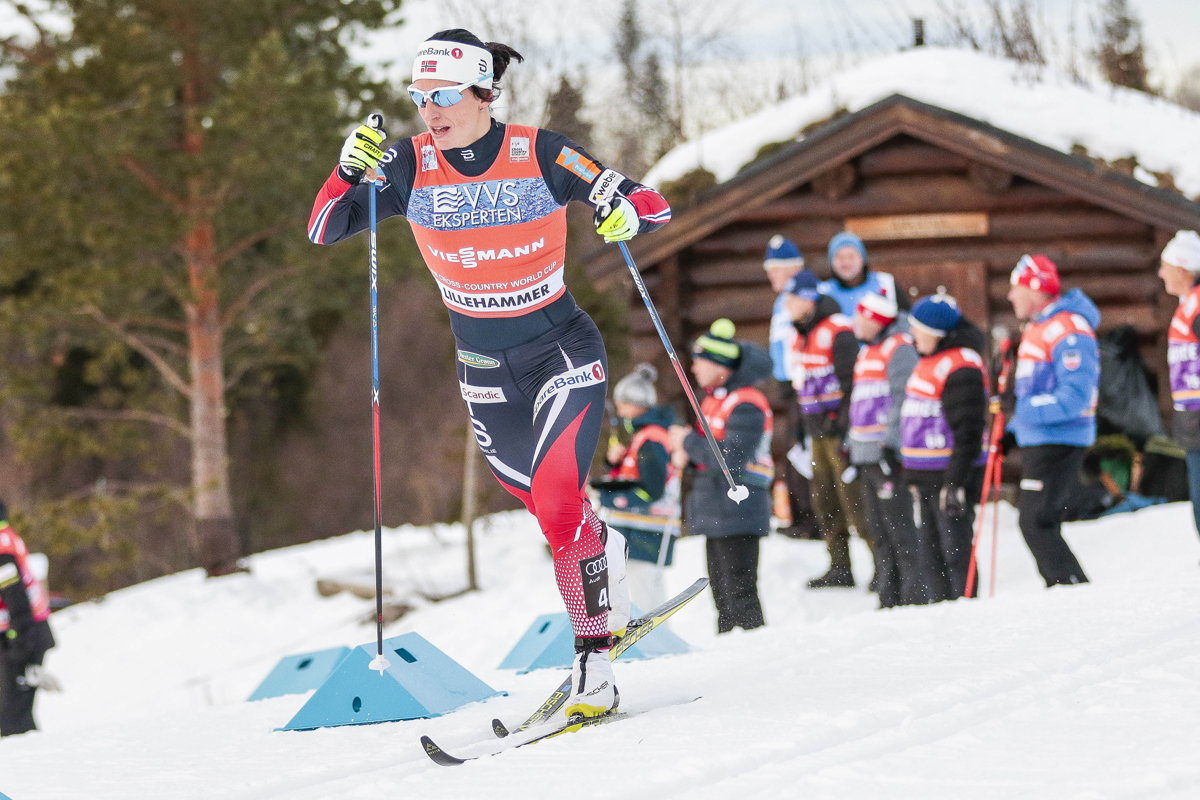
“That’s something I was prepared for before the season started,” the 36-year-old told the Norwegian press after the race. “Things are a little different than they have been in the past. I trained well after [the opening FIS races in] Beitostølen, and with the two races last weekend the total load of work has been relatively high– and now three quick races here. I tried [to stay with Parmakoski when she passed] but it just wasn’t my day.”
Bjørgen leads the distance standings, because she won the 10 k classic in Kuusamo, Finland, and mini-tour stages only award half the number of World Cup points as a standard World Cup race would.
Sweden’s Stina Nilsson landed fifth (+1:26.1) after skiing up from 27th place at the start. That gave her the fourth-fastest split time of the day.
“I had decided to take it a little easy in the beginning,” Nilsson said.
She is now also fifth in the overall World Cup rankings, which Weng leads by 90 points over Østberg. All were beneficiaries of the big overall points bonus which is awarded based on total mini-tour results: 100 points for Weng, the same as winning a stand-alone race.
While Nilsson started conservatively and then sped her way through the field as she warmed up, that’s not the strategy Diggins had taken. The American initially followed Østberg on the first few hills before falling back through field and ultimately ended up eighth (+1:39.4).
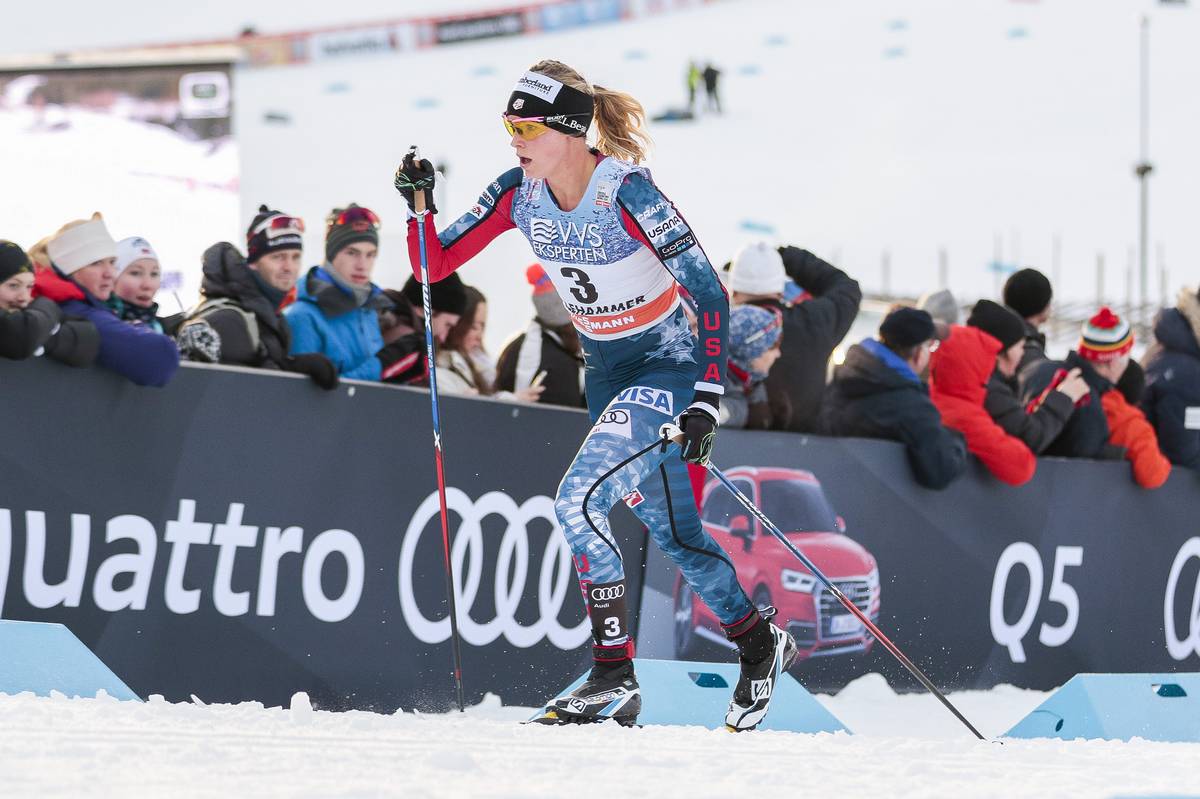
“I started out just trying really hard to hold my position,” Diggins said in a finish-line interview. “I think in my excitement to try to follow Ingvild and Marit and learn from them, I was pushing my luck a little bit. So maybe I just took it out a little too hot.”
With a maximum climb of 64 meters – over 200 feet of elevation – that had consequences later in the race.
“I really lost my technique out there,” Diggins admitted. “I got a little tired and I was struggling a little bit to kick– as it was getting warmer out there, I was folding over and my technique was really bad. I lost some time definitely on the uphills. It was a hard race for me.”
But she was pleased with her mental management of the race once the wheels started to come off.
“At the end I was able to get it together and not lose as many places,” she said. “It’s hard when you know there’s a big group working together chasing you. I was happy to be able to hold onto the top ten. And just to keep it in perspective sometimes, if this had been last year, it would have been the most amazing day.”
Just a few places back, U.S. teammate Sadie Bjornsen crossed the line in 11th, +1:51.2. Bjornsen had started 12th, in a group of six women within ten seconds. She skied in a pack for the entire race and finished just half a second behind Norway’s Ragnhild Haga and the top ten.
Liz Stephen was 38th (+3:31.8), and Rosie Brennan and Caitlin Patterson 41st (+3:50.2) and 42nd (+3:56.8), respectively.
“It was good to get another race under my belt,” Stephen said. “I mean, I was hoping for a top 30, and it wasn’t enough … Classic is still a work in progress for me, and it just didn’t happen for me today.”
Patterson was also not completely satisfied with her race, saying she also suffered from choosing skis with less than bombproof kick.
“It wasn’t what I wanted to feel,” Patterson said. “Heavy legs. I think my skis were a little slick too. The bad combination of not very good energy and slick skis made it really tough out there.”
Ida Sargent rounded out the U.S. results in 57th (+5:39.7).
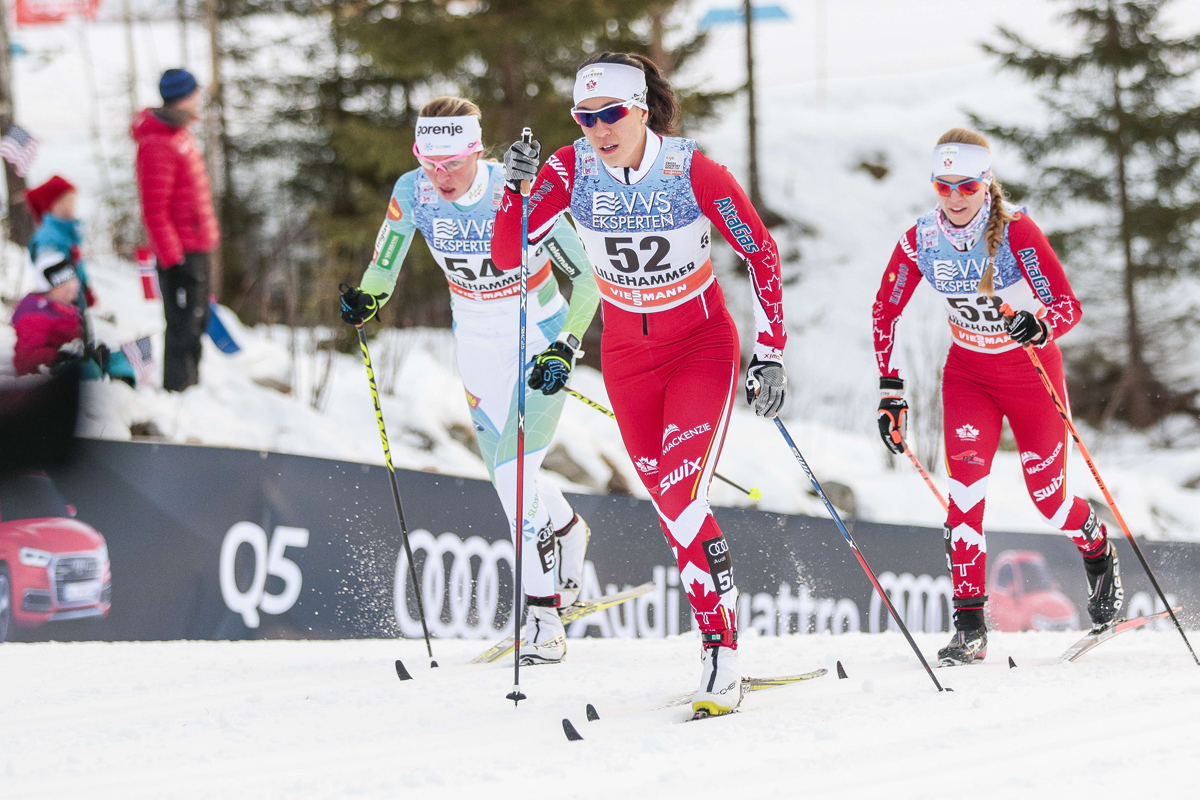
Emily Nishikawa led the Canadians in 46th (+4:08.5), with Cendrine Browne and Dahria Beatty 52nd (+4:41.5) and 59th (+6:08.2), respectively.
Nishikawa moved up from a starting bib of 52.
“It felt really good, and it was a lot of fun just to be in a pursuit start race and chasing after the next girl ahead of me,” she said in a Cross Country Canada press interview. “I’m really happy with the way I felt. I’m starting to feel like my old self again. My race form is coming around.
Chelsea Little
Chelsea Little is FasterSkier's Editor-At-Large. A former racer at Ford Sayre, Dartmouth College and the Craftsbury Green Racing Project, she is a PhD candidate in aquatic ecology in the @Altermatt_lab at Eawag, the Swiss Federal Institute of Aquatic Science and Technology in Zurich, Switzerland. You can follow her on twitter @ChelskiLittle.



